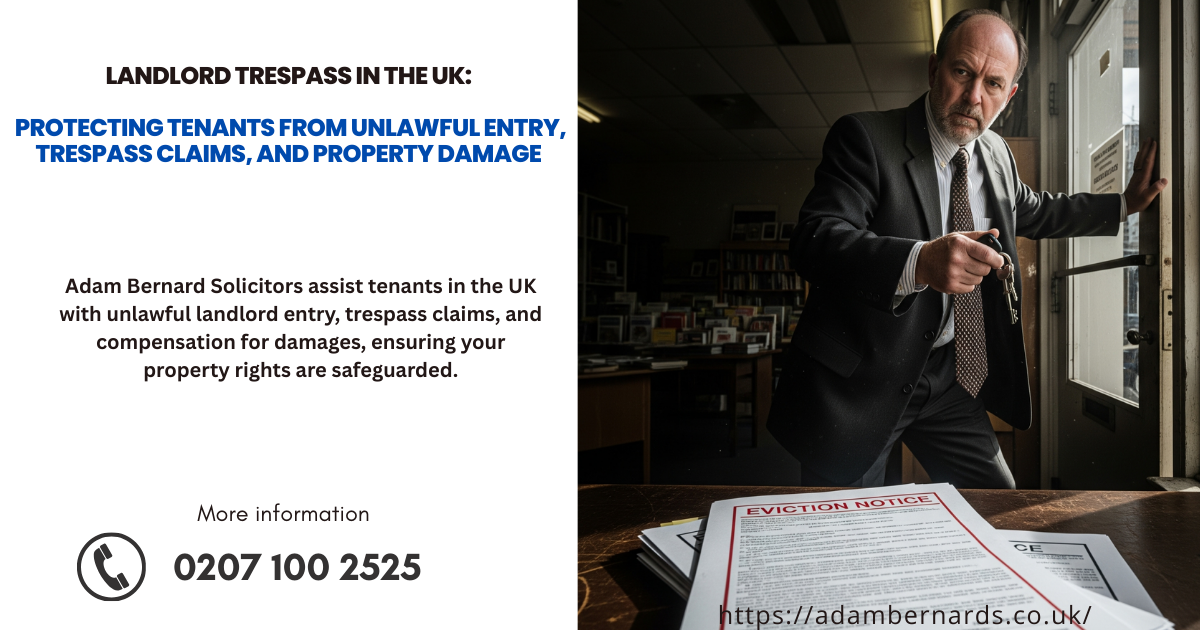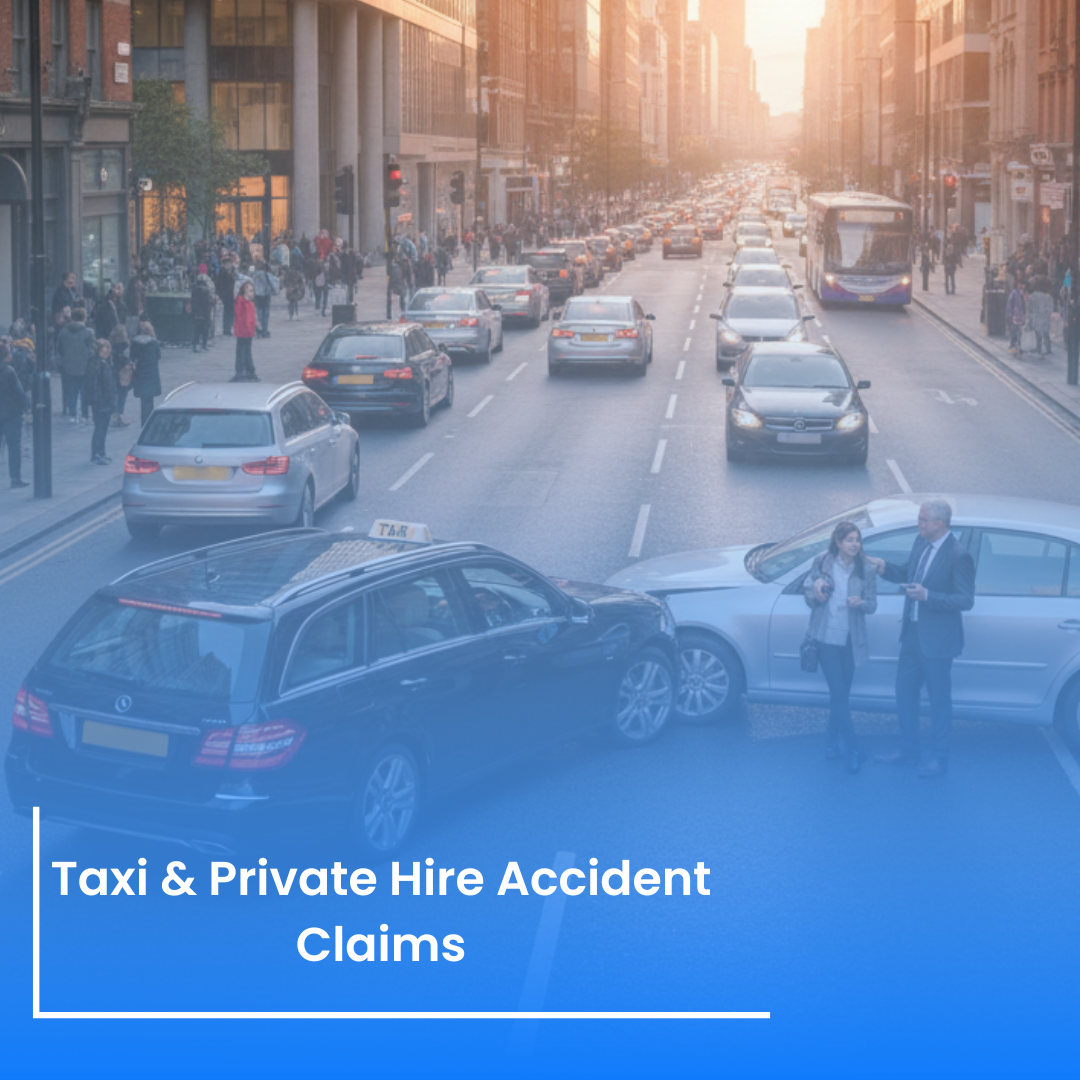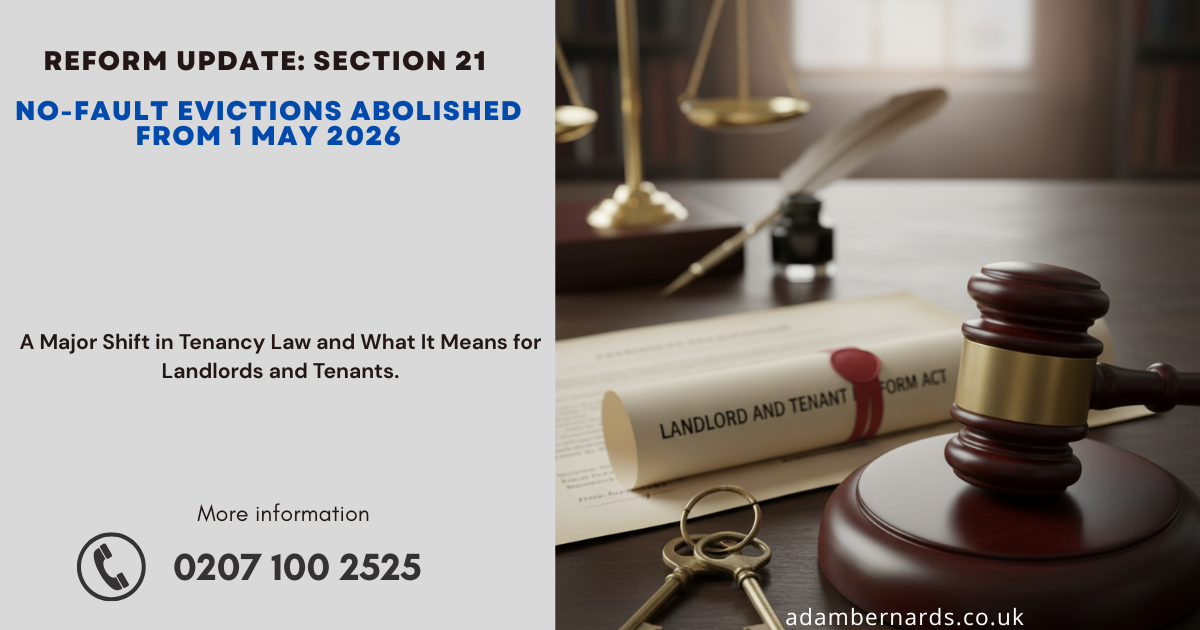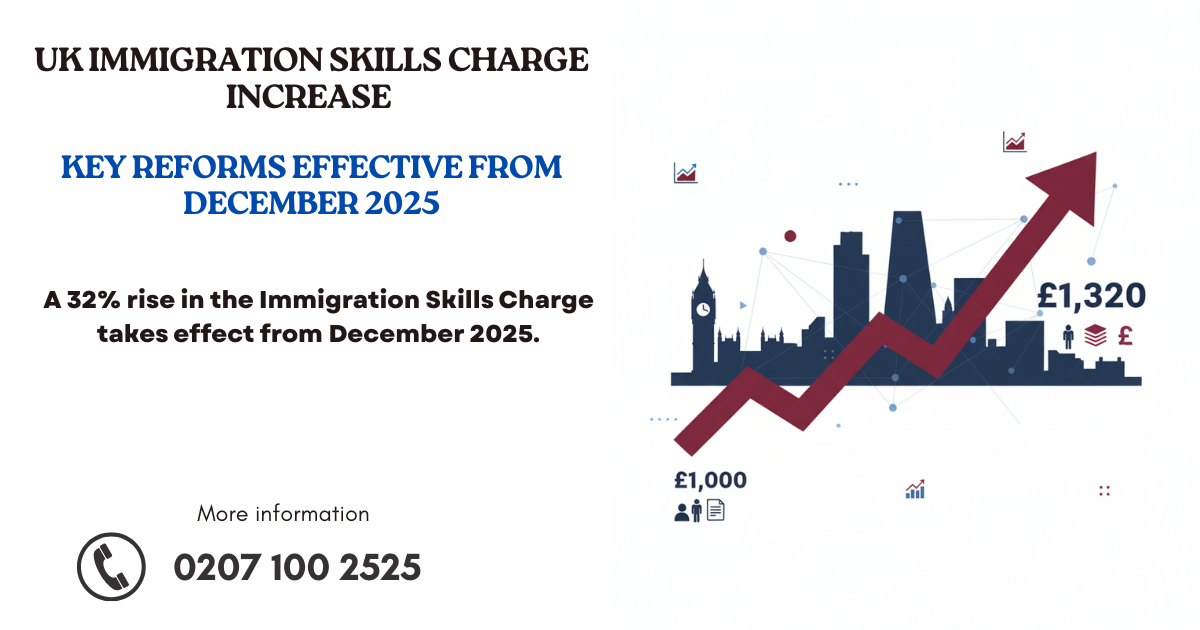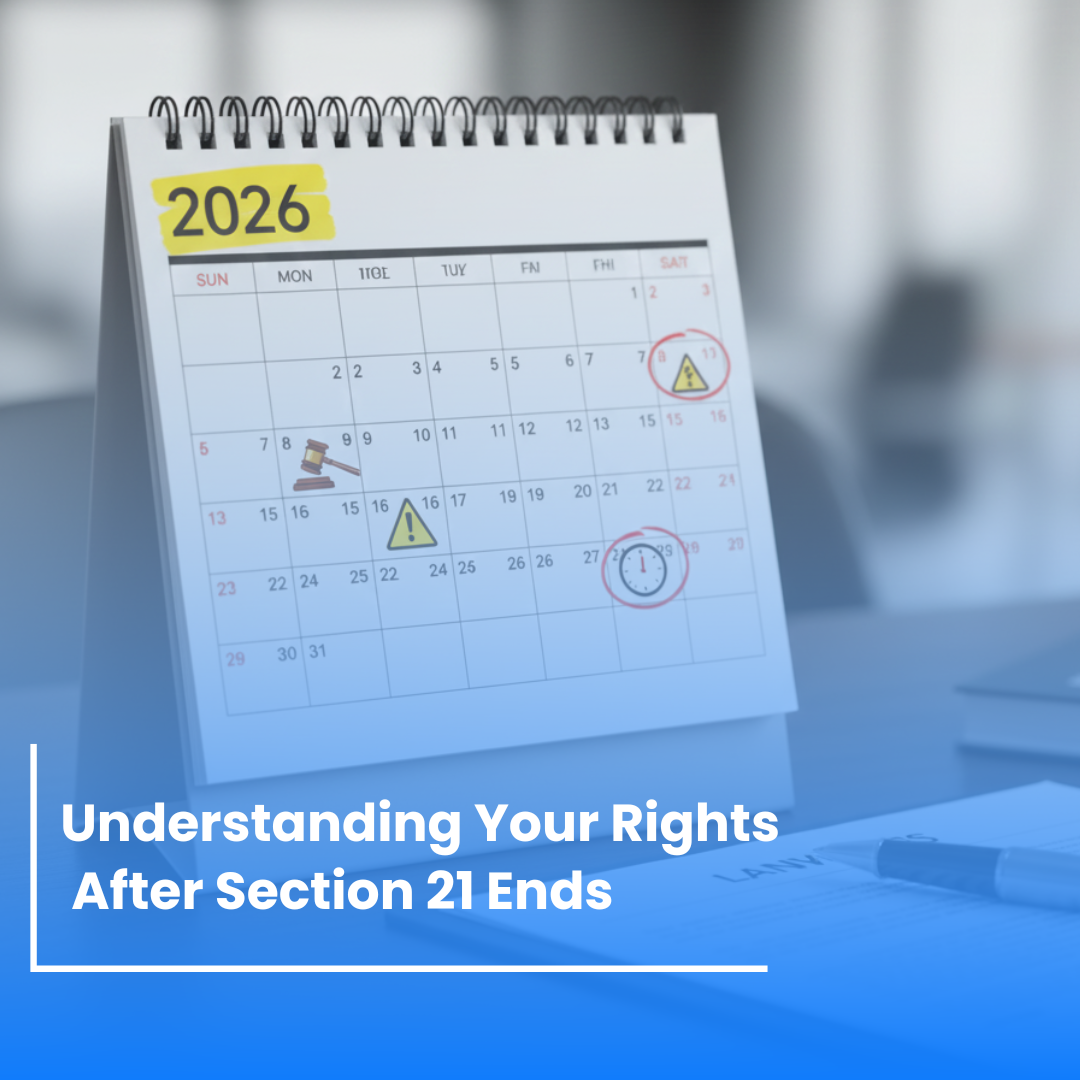In the UK, problems with trespassing, illegal entry, mesne profits, and landlord liability can lead to complicated conflicts between landlords and tenants. Adam Bernard Solicitors is an expert in landlord and tenant law, guiding clients through trespassing, possession, and damage claims cases.
Understanding Trespass in Landlord and Tenant Law
When someone enters or stays on property without permission, it is considered trespassing. Trespassing in a landlord-tenant relationship can happen in a number of ways:
- When a landlord enters a tenant’s property without permission or the required notice, it is known as landlord trespass.
- Tenant trespassing occurs when a tenant uses spaces beyond those specified in the lease or stays in their flat after their tenancy has ended (holding over). Landlords may claim mesne profits for lost rental income if commercial tenants stay in desirable business locations.
- Third-Party Trespass – where visitors or strangers interfere with the property.
Even though simple trespassing is typically considered a civil wrong, liability can have serious repercussions, especially when it is connected to mesne profits, illegal entry, and possession proceedings.
Landlord Liability for Trespass
1. Unlawful Entry by Landlords
It is not a given that a landlord can enter the property whenever they want. Tenants are entitled to quiet enjoyment even though they own the property. It may be considered harassment and trespassing if a landlord enters without authorization or without giving the required notice as stipulated in the tenancy agreement.
Instances of illegal landlord entry include:
- Entering without giving twenty-four hours’ notice to inspect repairs.
- Entering with keys without the tenant’s permission.
- Entering commercial property again without adhering to the correct forfeiture protocols.
Remedies available to tenants include:
- Declarations to stop additional trespassing.
- Compensation for loss, discomfort, or distress.
- The Protection from Eviction Act of 1977 covers harassment claims.
Landlord Liability for Tenant Trespass
If a landlord authorizes, permits, or ignores wrongful occupation, they may be held accountable for tenant trespass in some circumstances. For instance:
- permitting trespassing by tenants on nearby property.
- Landlords may be held liable to third parties if they refuse to let tenants stay past the end of their lease.
- Subtenants who are still in illegal possession.
In order to reduce liability, landlords are required by CPR Part 55 to initiate possession proceedings promptly.
Examples of case law:
- It was made clear in Ministry of Defence v. Ashman [1993] that overstaying tenants may be held liable for mesne profits.
- Calculation techniques based on reasonable occupation value were highlighted in Jones v. Carter [2023].
Problems Faced in Trespass and Mesne Profits Claims
Both landlords and tenants encounter challenges:
Regarding Landlords:
- Rent is being lost due to overholding tenants.
- Accurately calculating mesne profits is difficult.
- liability for neighboring trespasses by tenants.
- danger of unauthorized re-entry, which could result in damage claims from tenants.
Regarding Tenants:
- Landlord harassment and illegal entry.
- ignorance of their legal rights to compensation.
- facing eviction without following the correct legal procedure.
Regarding Commercial Landlords
- Illegal Lease Forfeiture: Commercial landlords may re-enter office or retail spaces without adhering to legal protocols, putting them at serious risk of trespassing.
- Mesne Profits in Business Tenancies: When tenants hold over, there are frequently disagreements about how much to value mesne profits, especially when the space generates revenue for the business.
- Double Rent Claims: When commercial property owners fail to vacate after notice periods have passed, they may be able to collect double rent under UK law.
How Adam Bernard Solicitors Can Help
Adam Bernard Solicitors offers expert counsel and representation in the following areas:
- Claims for Landlord Trespass: Notifying tenants when landlords enter the property illegally or obstruct their possession.
- Helping landlords when tenants overstay, refuse to leave, or trespass onto nearby property is known as tenant trespass liability.
- Mesne Profits Claims: Defending tenants and landlords in conflicts involving mesne profits and use and occupation damages.
- Possession Proceedings: Managing claims to legally regain possession under CPR Part 55, Section 8, and Section 21.
- Emergency Relief and Injunctions: Obtaining immediate injunctions to prevent harassment or unauthorised landlord entry.
- Commercial Landlord & Tenant Conflicts: Offering guidance on trespass damages, illegal re-entry, and forfeiture in commercial property.
- Protecting Tenant Rights: Assisting renters who are being forcibly evicted, harassed, or trespassed by their landlords.
Practical Examples of Our Work
- Trespass by a Commercial Landlord: We represented a tenant in a case where the landlord changed locks and re-entered the property illegally. An injunction and damages were secured.
- Tenant Overholding (Mesne Profits Claim): In order to obtain compensation until possession was reclaimed, we represented a landlord pursuing mesne profits against a tenant who was holding over under a commercial lease.
- Landlord Harassment: We secured damages and stopped additional interference on behalf of tenants who had been subjected to repeated unlawful entry.
Summary
Tenant and landlord trespass, mesne profits, and illegal entry disputes can easily turn into expensive legal battles. Tenants and landlords have legal rights and responsibilities.
- Tenants are shielded from harassment and illegal entry.
- When tenants trespass, landlords may claim mesne profits and must follow the correct possession procedures.
- Damages and illegal re-entry present additional challenges for commercial landlords and tenants.
Landlords and tenants in London and the UK can get professional representation from Adam Bernard Solicitors. Our housing solicitors are available to defend your rights whether you need to seek an injunction for unlawful landlord entry, defend against trespassing claims, or claim mesne profits.
Get in touch with us right now for a private consultation on trespassing disputes between tenants and landlords.
Frequently Asked Questions
Can a landlord be liable for tenant trespass in the UK?
Yes, if the landlord authorises, encourages, or fails to prevent tenant trespass. In commercial landlord and tenant cases, liability can arise where the landlord takes unlawful action.
What are mesne profits in landlord–tenant law?
Mesne profits are damages claimed when a tenant remains in possession after the lease ends or when a landlord unlawfully enters and deprives the tenant of quiet enjoyment.
How are mesne profits calculated in UK trespass cases?
Courts typically calculate mesne profits at the market rental value of the property during the unlawful occupation, sometimes including consequential losses.
Can a landlord claim mesne profits against a tenant who overstays?
Yes, landlords can bring a mesne profits claim or a double rent claim if the tenant unlawfully holds over after lease expiry.
Can a tenant sue a landlord for trespass and unlawful entry?
Absolutely. Tenants can seek damages, injunctions, and in some cases punitive damages where landlords trespass or unlawfully enter without consent.
What is the difference between mesne profits and double rent in the UK?
- Mesne profits: Damages for unlawful use and occupation of land.
- Double rent: A statutory penalty where a tenant remains after serving notice to quit but refuses to vacate.
What remedies do tenants have if a landlord trespasses?
Tenants may claim damages, seek an injunction against further trespass, or pursue a claim for harassment and unlawful eviction.
Can commercial landlords face trespass liability?
Yes, particularly if they unlawfully re-enter premises without a possession order. Courts often award damages in such cases.
What commercial landlord trespass issues are most common?
Unlawful forfeiture of leases, self-help re-entry without a court order, and disputes over mesne profits in business tenancies are the most common.
Is it Illegal to Enter Someone’s House Without Permission in the UK?
Yes, entering someone’s house without permission in the UK is generally illegal. This can fall under both criminal and civil law, depending on the circumstances.
United Kingdom trespassing:
- When someone enters private property without authorisation but without breaking any laws, it is referred to as civil trespass.
- When someone enters a property with the intention of committing a crime, like theft, vandalism, or harassment, it is known as criminal trespass.
Unauthorised Entry into a Person’s Home:
- Under UK law, it could be considered burglary if someone enters your home without your consent, even if they don’t take anything.
- If someone enters a building as a trespasser with the intention of committing theft, assault, or criminal damage, it is considered a burglary under the Theft Act of 1968.
How can Adam Bernard Solicitors help commercial landlords with trespass disputes?
We assist commercial landlords in lawfully regaining possession, defending trespass claims, calculating mesne profits, and ensuring compliance with statutory procedures to avoid liability. Our team provides expert guidance to protect your interests.


